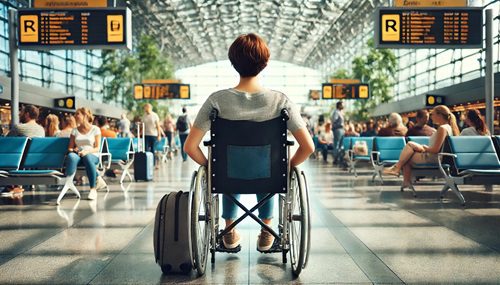 Travelling by air can present unique challenges for elderly and disabled passengers. However, a smooth and enjoyable journey is achievable with careful planning and awareness of the available resources. VELA Chairs, renowned for its mobility solutions for seniors and disabled individuals, provides invaluable tips to enhance your air travel experience. From meticulous pre-flight preparation to utilizing adapted vehicles, here are five crucial tips to ensure accessibility and comfort throughout your journey.
Travelling by air can present unique challenges for elderly and disabled passengers. However, a smooth and enjoyable journey is achievable with careful planning and awareness of the available resources. VELA Chairs, renowned for its mobility solutions for seniors and disabled individuals, provides invaluable tips to enhance your air travel experience. From meticulous pre-flight preparation to utilizing adapted vehicles, here are five crucial tips to ensure accessibility and comfort throughout your journey.
Plan for a Seamless Experience
Preparation is paramount to a stress-free travel experience. Start by researching the airports and airlines you will be using to ensure they offer the necessary facilities and services, such as:
- Designated parking spaces
- Accessible transportation options
- Access to restrooms
- Assistance at critical points, including check-in, security, boarding, and disembarkation
Notify your airline at least 48 hours before departure if you require special assistance. This ensures your needs are met, whether it’s help with boarding or mobility aids. Importantly, you are entitled to travel with up to two items of mobility equipment free of charge, which do not count towards your baggage allowance.
Thea Johansen, an in-house physical therapist at VELA Chairs, emphasizes, “Planning ahead is essential for elderly and disabled travelers. Knowing what to expect and preparing accordingly can significantly reduce stress and ensure a more comfortable journey.”
Book Your Transportation in Advance
For those requiring adapted vehicles, booking transportation well in advance is crucial. Ensure the car can accommodate your mobility device, be it a wheelchair, scooter, or other aids. Advanced booking guarantees availability and allows for any necessary accommodations.
Arrive Early to Alleviate Stress
Arriving at the airport early provides ample time to navigate security and reach your gate without rushing. This is particularly important for elderly and disabled travellers needing additional time or assistance. Inform the airline staff upon arrival about your mobility needs to ensure you receive help from the outset.
“Giving yourself extra time at the airport can make a huge difference,” notes Thea Johansen. “It allows you to move at your own pace and handle any unexpected situations calmly.”
Know Your Rights and How to Claim Them
Understanding your rights as a traveller with reduced mobility is essential. Regulations such as the European Union’s Regulation (EC) No 1107/2006, the Air Carrier Access Act (ACAA) in the United States, the Accessible Transportation for Persons with Disabilities Regulations (ATPDR) in Canada, and the United Nations Convention on the Rights of Persons with Disabilities (CRPD) globally, mandate that airlines and airports provide necessary assistance to ensure passengers with disabilities enjoy air travel comparable to other citizens. Familiarize yourself with these regulations to confidently claim the support you’re entitled to.
Be Prepared for Unforeseen Circumstances
Travel can be unpredictable, so it’s important to prepare for unexpected events. Stay calm and request assistance if needed. Airport and airline staff are trained to help passengers with reduced mobility. Having a contingency plan and knowing where to seek help can make a significant difference in managing travel hiccups.
Air travel for elderly and disabled passengers can be challenging but feasible with the proper preparation and knowledge. Planning, booking necessary transportation, arriving early, understanding your rights, and being prepared for the unexpected can ensure a smoother and more enjoyable journey. Everyone deserves a comfortable travel experience; with these tips, you can make your next trip memorable.
“Traveling should be accessible to everyone, regardless of age or ability,” emphasizes Thea Johansen. “With the proper preparation and support, elderly and disabled travelers can enjoy the same enriching experiences as anyone else.”
For more detailed information on air travel regulations and assistance, visit the European Union Aviation Safety Agency and the U.S. Department of Transportation.
Written by: Michelle Warner























Exceptional story: thank you for sharing.